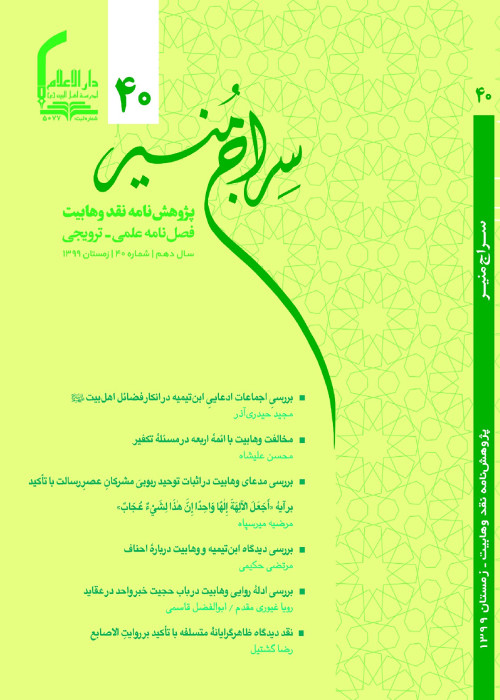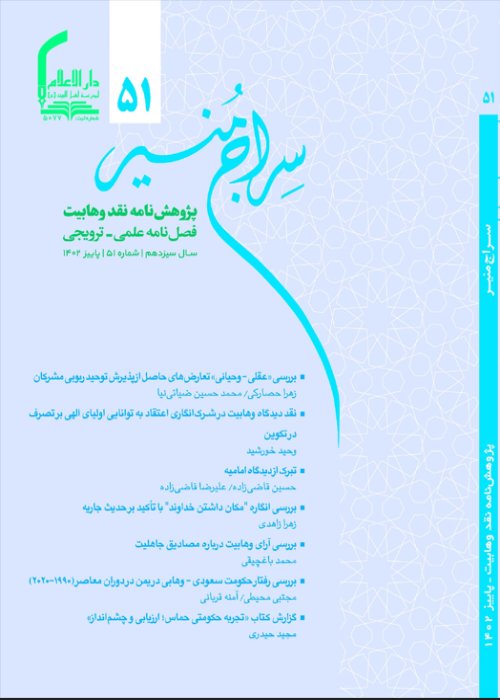فهرست مطالب

نشریه سراج منیر
سال دهم شماره 40 (زمستان 1399)
- تاریخ انتشار: 1400/12/29
- تعداد عناوین: 6
-
صفحات 17-39
یکی از شگردهای ابن تیمیه در مقام پاسخگویی به مخالفین خود و نیز در راستای اثبات مدعاهای خویش، تمسک به اجماع با تعابیر مختلف می باشد. ازجمله موضوعاتی که وی زیاد به اجماع، متوسل شده است، مباحث مربوط به فضایل اهل بیت می باشد. وی در این زمینه، گاهی ادعای اجماع و اتفاق اهل علم یا عالمان به حدیث و... مبنی بر جعلی و دروغ بودن روایات مربوط به فضایل اهل بیت می کند و گاهی هم ادعای اجماع بر افضل بودن دیگران، نسبت به اهل بیت دارد، بدون اینکه مستندی برای این اجماعات، ارایه کرده باشد؛ درحالی که با تتبع در منابع اهل سنت، این اجماعات، نقض شده و حتی اجماعاتی برخلاف اجماع مدنظر ابن تیمیه، یافت می شود. در ضمن، دو مقاله این قبیل از اجماعات ادعایی ابن تیمیه، راستی آزمایی می شوند.
کلیدواژگان: ابن تیمیه، اجماع، اتفاق، فضائل اهل بیت -
صفحات 41-56
یکی از مسایلی که مسلمانان از همان ابتدا با آن مواجه بودند، مسیله کج اندیشی برخی از افراد درباره حدود اسلام بود. چنین افرادی به سبب نداشتن درک درستی از ارکان اسلام، دیگر مسلمانان را تکفیر می کردند و در زمان حاضر نیز چنین اندیشه ای، به مراتب شدیدتر از گذشته، در جامعه اسلامی گسترش یافته است. در پژوهش پیش رو، دیدگاه ایمه مذاهب اربعه و وهابیت در مسیله تکفیر بررسی شده که با توجه به جایگاه ویژه ایمه مذاهب در میان اهل سنت، پژوهش در چنین موضوعی، از اهمیت بالایی برخوردار است. پژوهش پیش رو، به دنبال پاسخ به این سوال است که میان وهابیت و ایمه مذاهب درباره تکفیر مسلمانان چه تفاوت هایی وجود دارد؟ وهابیت، اکثریت مسلمانان را به سبب ارتکاب برخی از اعمال، مانند استغاثه، تبرک، طلب شفاعت، نذر، ذبح، قسم به غیر الله و... تکفیر می نمایند. از دید آنها ارتکاب این گونه اعمال، ناقض شهادتین است و مرتکب شونده چنین اعمالی از اسلام خارج می شود. چنین اندیشه ای مخالف اندیشه ایمه مذاهب چهارگانه است. آنها به سبب ارتکاب چنین اعمالی، تکفیر مسلمانان را جایز نمی دانستند.
کلیدواژگان: تکفیر، وهابیت، ائمه اربعه -
صفحات 57-77
وهابی ها معتقدند، شرک مشرکان مکه در عصر رسالت پیامبر اکرم$ فقط در الوهیت خداوند بود و در ربوبیت خداوند، موحد بودند. یکی از آیاتی که برای اثبات عقیده مذکورشان به آن استناد می کنند، آیه 5 سوره صاد است:]اجعل الآلهه الها واحدا إن هذا لشیء عجاب[؛ «آیا او چندین خدای ما را منحصر به یک خدا کرده و به خدای یگانه، دعوت می کند؟ این بسیار تعجب آور و حیرت انگیز می باشد». این نوشتار با بهره گیری از کتب تفسیری و با روش تحلیلی _ انتقادی به تبیین وجه دلالت آیه، وجه تعجب مشرکان و ارتباط معنای اله و رب، پرداخته است و نشان می دهد که اعتقاد مشرکان مکه به آلهه متعدد از اعتقاد به رب دانستن آلهه شان، نشات گرفته بود و آیه مذکور، افزون بر شرک الوهی بر شرک ربوبی مشرکان عرب جاهلی نیز دلالت دارد.
کلیدواژگان: شرک ربوبی، وهابیت، عصر رسالت، اله، آیه 5 سوره ص -
صفحات 79-95
عناصر تکفیری _وهابی، همواره به عموم مسلمانانی که با رویکرد یک جانبه گرایانه آنان، همراه و موافق نبوده اند، با بدبینی نگریسته و از هر فرصتی برای ابراز مخالفت و تخریب آنان استفاده کرده اند. گاهی به آنها حملات قلمی و لفظی داشته و مذاهب اسلامی را یهودی و بدعت گذار و متعصب و... نامیده اند، گاهی هم در عرصه علمی، مخالفت هایی با آنها داشته و نظراتی از آنان را رد کرده اند که آن نظرات، مورد تایید نصوص شرعی بوده است؛ لذا رویکردهای ناصحیح عناصر تکفیری _ وهابی، منحصر به مواجهه با شیعه نیست و وهابیان و تکفیریان، هر مسلمانی را که با خود، هم عقیده نیابند، به هر شکلی که بتوانند با وی مبارزه خواهند کرد. در این نوشتار، بعد از ذکر پاره ای اتهامات وهابیت نسبت به احناف ازجمله نسبت کفر، یهود و عالم پرستی به برخی از اختلافات منهجی آنها با احناف نیز پرداخته شده است.
کلیدواژگان: ابوحنیفه، ابن تیمیه، وهابیت، احناف، تقلید، تکفیر -
صفحات 97-112
یکی از مبانی نظری وهابیت در حوزه مسایل اعتقادی این است که خبر واحد اعتقادی، بسان اخبار فقهی حجت است. ایمان به آن واجب و عدم ایمان، به منزله مخالفت با سنت رسول خدا - محسوب می شود؛ از این رو، دست به تکفیر مسلمانان زده اند و مخالفان حجیت خبر واحد را در عقاید کافر شمرده اند، با بررسی کتب وهابیت در این مسیله روشن می شود که علمای نجد برای اثبات این نظریه خود به برخی احادیث تمسک کرده اند که از مهمترین آنان، روایت فرستادن معاذ به یمن، تعلیم مردم یمن توسط ابوعبیده و خبر تغییر قبله، است. اصلی ترین اشکال این روایات این است که خبر واحد نمی تواند حجیت خود را اثبات کند؛ زیرا اثبات حجیت خبر واحد به وسیله خبر واحد مستلزم دور بوده و دور باطل است. علاوه بر اشکال فوق هر کدام از روایات با اشکالات دیگری نیز روبه رو هستند. اشکال روایت معاذ و ابوعبیده این است که مصداق خبر واحد بدون قرینه نیست. اشکال روایت تحویل قبله علاوه بر تعارض با اخبار تاریخی، موضوع آن یک فرع فقهی است که درباره حجیت خبر واحد در احکام شرعی اختلافی وجود ندارد.
کلیدواژگان: خبر واحد، عقاید، حجیت، وهابیت -
صفحات 143-153
کتاب التوسل و احکامه و انواعه، تالیف علامه شیخ محمد عابد سندی در 118 صفحه، توسط المکتبه المجددیه النعیمیه، در سال 1428 در کشور پاکستان، چاپ شده است. شیخ محمد، در سال 1190 قمری در پاکستان و در خانواده ای از اهل علم، به دنیا آمد. او در چهار سالگی، همراه پدربزرگ، پدر و عمویش که همگی از علمای حنفی مذهب بودند، به حجاز هجرت کرد. وی دوران نوجوانی و جوانی خویش را مشغول تحصیل علم بود و بعد از سال ها مجاهدت علمی، سرآمد علمای عصر خویش گردید و بعد از هجرت به یمن، سال ها در شهر زبید که پایگاه علم، فقاهت، حدیث و... بود، قاضی القضات آن دیار شد. وی به سبب مهارت در علم طب، طبیب مخصوص حاکم یمن شد و در دستگاه حکومت، جایگاه ویژه ای پیدا کرد. بعد از آنکه شیخ محمد عابد، تصمیم گرفت به مدینه هجرت کند، از طرف حاکم مصر و حجاز، به ریاست علمای مدینه، منصوب شد و تا زمانی که زنده بود، ملجا علما، فقها و قضات بود و مشکلات علمی، به دست او برطرف می شد. شیخ محمد، دوران اول حکومت آل سعود را درک کرده و با انحراف گروه ضاله وهابیت از نزدیک آشنا بود و در رد افکار آنان تلاش می کرد. کتاب حاضر، به صورت پرسش و پاسخ، نوشته شده و شبهه ای را که وهابیت در باب توسل، مطرح می کنند، بررسی کرده است.
-
Pages 17-39
One of Ibn Taymiyyah's tricks in responding to his opponents and also in order to prove his claims is claiming consensus with different expressions. One of the topics on which he has resorted to consensus is the issues related to the virtues of the Ahl al-Bayt. In this regard, he sometimes claims that all of the of the scholars concur that the narrations related to the virtues of the "Ahl al-Bayt" are fake and false, and sometimes claims the consensus on the superiority of others over the Ahl al-Bayt, without providing any documentation. While following the Sunni sources, we find that these consensuses have been violated and even consensuses can be found contrary to the consensus claimed by Ibn Taymiyyah. In this essay, the claimed consensuses of Ibn Taymiyyah are studied.
Keywords: Ibn Taymiyyah, consensus, concordance, the Virtues of the Ahl al-Bayt -
Pages 41-56
One of the issues that concerns the minds of Muslims from the very beginning of Islam was misunderstanding about the Takfir and accusing others to heresy. Some did not have enough knowledge from the pillars and principles of Islam and began accusing others to heresy. At the present time, this way of thinking is gaining attention as well, and even worse than before. In the present study and by descriptive and analytic method, the views of four main religious leaders in Sunni world and the Wahhabi school of thought is discussed. The main goal of this study is to find what is the difference between Wahhabi thought and the four main Sunni religious leaders in this case? The findings are as the following: Wahhabi school accuses the majority of Muslims to polytheism and blasphemy because of the following deeds: appealing from others, intermediation of humans to God, making a vow, sacrificing and taking an oath for someone other than God. They maintain that this kind of deeds are against the Tawhid and the doer of these kinds of acts must be considered non-Muslim. This way of thought is against the major Sunni religious leaders, maintaining that these kinds of deeds are permissible in Islam and we must not accuse others to blasphemy.
Keywords: Takfir, Wahhabism, the Four Main Sunni Religious Leaders -
Pages 57-77
The Wahhabis believe that the polytheism of the polytheists of Mecca at the Holy prophet time was only in the divinity of God but they believed in the deity of God. One of the verses that the Wahhabi uses as a proof for his claim is the verse: 38:5: ‘Has he reduced the gods to one god? This is indeed an odd thing!’This essay, using the exegesis book, tries to analyze this verse and explain the meaning of this verse. It will be explained why the polytheists were astonished and what is the semantic meaning between God and deity. The result is that the polytheists in Mecca did not believe in God were polytheists and the ignorant Arabs were pagans.
Keywords: Polytheism in Deity, Wahhabism, the Age of Holy Prophet, God, the Verse: 38:5 -
Pages 79-95
Takfiri-Wahhabi guys have always viewed the general Muslim population, who have disagreed with their one-sided approach, with pessimism and have used every opportunity to express their opposition and animosity toward them. Sometimes they have attacked verbally to Muslims, calling the Muslims Jews, heretic, and fanatic, and sometimes in the scientific arena, they have opposed the main stream Muslims and rejected their views, which have been approved by the religious texts. Therefore, the incorrect approaches of the Takfiri-Wahhabi guys are not limited to opposing the Shiites, but also they will fight any Muslim who does not approve their beliefs. In this essay, after mentioning some of the accusations of Wahhabism towards the Hanafis, for example, calling them infidels and Jews, the main methodological differences of Wahhabi with the Hanafis are discussed.
Keywords: Abu Hanifa, Ibn Taymiyyah, Wahhabi, The Hanafi, Taghlid, Takfir -
Pages 97-112
One of the creeds of Wahhabism is that the "single narration" in the faith issues is authentic just like the jurisprudential realm. We must have faith in that and if someone denies that it will be considered as opposing to the tradition of the Holy prophet Muhammad (PBH). Hence, the Wahhabis accused Muslims to blasphemy and heresy for denying the authority of "single narration" in the faith issues. In this research, by descriptive- analytic method, the Wahhabi sources are studied and the findings are as the following: the Najd scholars for proving their claim have resorted to some narrations and Hadiths. Some of the famous ones are the followings: the narration that tells that the Holy Prophet (PBH) sends the Maaz to Yemen, the narration about changing the direction of Ghibla. The main problem with these narrations is that the single narration cannot prove its authenticity, because this is a vicious circle. Furthermore, there are some other problems with these narrations as well. The Maaz narration is a single narration that has no other indicator to help it. Also, the narration of changing the direction of Ghibla is in contradiction with historical narrations and it refers to a jurisprudential topic, and there is no doubt in authenticity of single narration in jurisprudential topics.
Keywords: Single Narration, the Beliefs, Authenticity, Wahhabism


